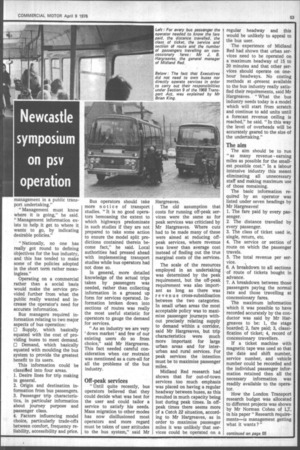Newcastle symposium on psv operation
Page 55

If you've noticed an error in this article please click here to report it so we can fix it.
management in a public transport undertaking."
"Management must know where it is going," he said. "Management information exists to help it get to where it wants to go, by indicating desirable policies."
"Nationally, no one has really got round to defining objectives for the bus industry, and this has tended to make some of the policies adopted in the short term rather meaningless."
Operating on a commercial rather than a social basis would make the service provided further from what the public really wanted and increase the operator's need for accurate information.
Bus managers required information relating to two major aspects of bus operation: O Supply, which basically equated with the cost of providing buses to meet demand. 0 Demand, which basically equated with moulding the bus system to provide the greatest benefit to its users.
This information could be classified into four areas.
1. Desire lines for trip making in general.
2. Origin and destination information from bus passengers.
3. Passenger trip characteristics, in particular information about journey purpose and passenger class.
4. Factors influencing model choice, particularly trade-offs between comfort, frequency reliability, accessibility and price. Bus operators should take more notice of transport studies. "It is no good operators bemoaning the extent to which highways predominate in such studies if they are not prepared to take some action to ensure the model split predictions contained therein become fact," he said. Local authorities had pressed ahead with implementing transport studies while bus operators had not done so.
In general, more detailed knowledge of the actual trips taken by passengers was needed, rather than collecting information in a grossed up form for services operated. Information broken down into sections of routes was really the most useful statistic for operators to gauge the demand for services.
"As an industry we are very ' down market' and few of our existing users do so from choice," said Mr Hargreaves. This fact needed careful consideration when car restraint was mentioned as a cure-all for all the problems of the bus industry.
Off-peak services
" Until quite recently, bus operators believed that they could decide what was best for the user and could tailor a service to satisfy his needs. Mass migration to other modes has now disillusioned most operators and more regard must be taken of user attitudes to the bus system," said Mr Hargreaves.
The old assumption that costs for running off-peak services were the same as for peak services was criticised by Mr Hargreaves. Where cuts had to be made many of these were aimed at reducing offpeak services, where revenue was lower than average cost instead of finding out the true marginal costs of the services.
The scale of the resources employed in an undertaking was determined by the peak requirement, but the off-peak requirement was also important as long as there was revenue cross-subsidisation between the two categories. In small urban areas the most acceptable policy was to maximise passenger journeys without precisely relating supply to demand within a corridor, said Mr Hargreaves, but trip characteristics were much more important for large urban areas and for interurban and rural services. For peak services the intention must be to maximise passenger miles.
Midland Red research had shown that for out-of-town services too much emphasis was placed on having a regular headway between buses, as this resulted in much capacity being lost during peak times. In offpeak times there seems more of a Catch 22 situation, according to Mr Hargreaves, as in order to maximise passenger miles it was unlikely that services could be operated on a regular headway and this would be unlikely to appeal to the bus user.
The experience of Midland Red had shown that urban services need to be operated on a maximum headway of 15 to 20 minutes and that other services should operate on onehour headways. No costing methods at present available to the bus industry really satisfied their requirements, said Mr Hargreaves. "What the bus industry needs today is a model which will start from scratch and continue to add units until a forecast revenue ceiling is reached," he said. "In this way the level of overheads will be accurately geared to the size of the undertaking,"
The aim
The aim should be to run "as many revenue earning miles as possible for the smallest possible cost." In a labour intensive industry this meant eliminating all unnecessary staff and making maximum use of those remaining.
The basic information required by an operator was listed under seven headings by Mr Hargreaves?
1. The fare paid by every passenger.
2 The distance travelled by every passenger.
3. The class of ticket used ie, single, return, etc.
4. The service or section of route on which the passenger travels.
5. The total revenue per service.
6. A breakdown to all sections of route of tickets bought in advance.
7. A breakdown between those passengers paying the normal rate and those travelling at concessionary fares.
The maximum information which it was possible to have recorded accurately by the conductor was said by Mr Hargreaves to be: 1, the stage boarded; 2, fare paid; 3, classification of ticket; 4, record of concessionary travellers.
If a ticket machine with magnetic tape was used so that the date and shift number, service number, and vehicle number could be recorded and the individual passenger information retained then all the necessary information was readily available to the operator.
How the London Transport research budget was allocated to different projects was shown by Mr Norman Cohen of LIT, in his paper "Research requirements—is management getting what it wants ? "




























































































































